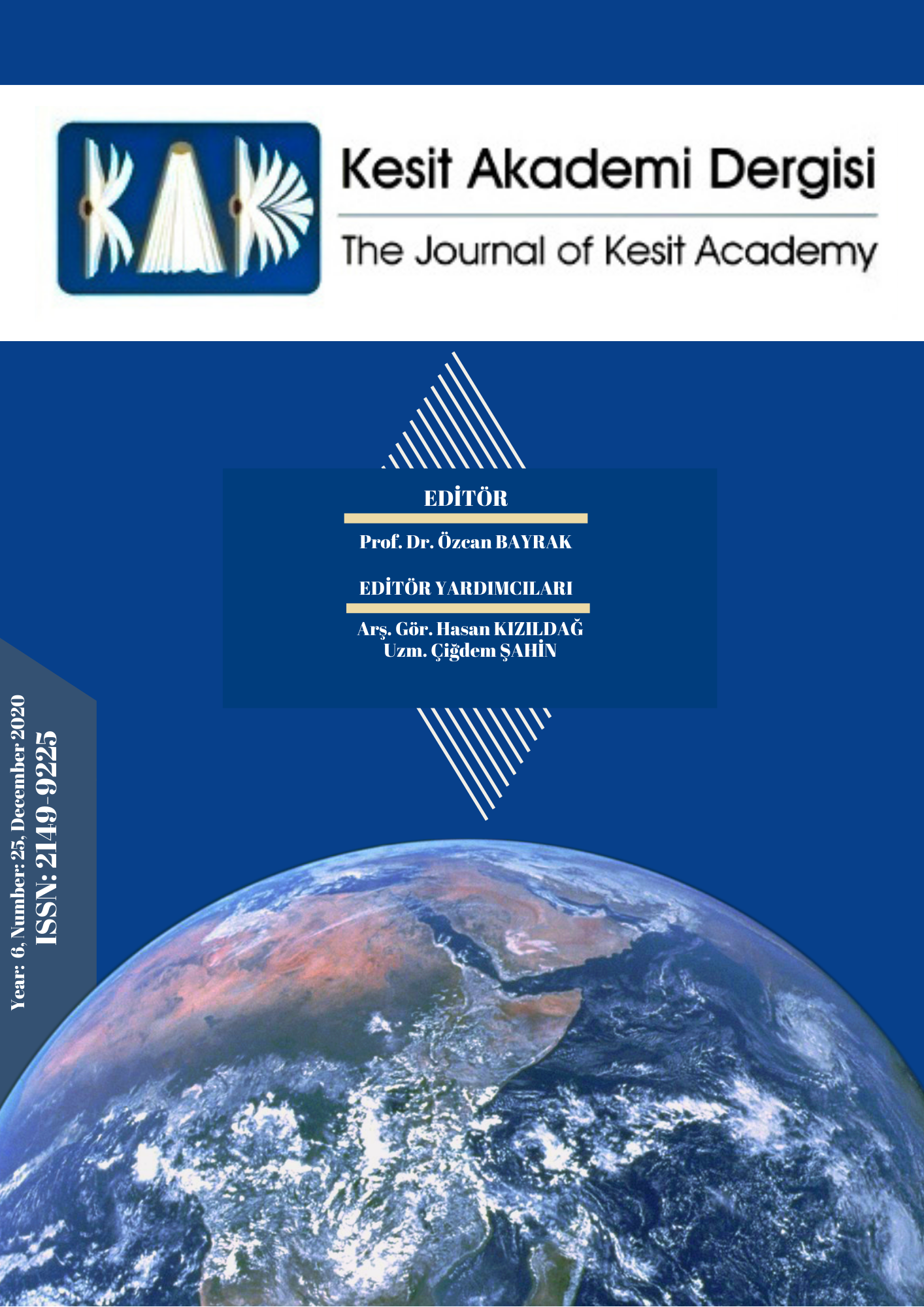Author :
Abstract
Bu çalışmada, beden ve hayatın iktidarın uygulama sahnesi haline gelişi Michel Foucault’nun metinleri üzerinden incelenmiştir. 17. yüzyılda yaşanan iktidar tekniklerindeki dönüşüm, iktidarı devletin ötesine taşıyan, onun sınırlarını aşan bir olgu haline getirmiştir. Foucault’nun stratejik oyun olarak tanımladığı bu ilişkiler, monarşi dönemindeki baskıcı ilişkilerden oldukça farklıdır. Bireyi özne haline dönüştüren bu iktidar biçimi, gündelik hayatın tamamına işlemiştir. Monark-tebaa ilişkisini aşan iktidar tekniği, yeni dönemle birlikte, halkı “nüfus” olarak gören bir hale dönüşmüştür. Bu bağlamda, iktidar artık halkın doğum, ölüm, hastalık, sağlık, cinsel hayat, çalışma kapasitesi gibi özelliklerine bakar olmuştur. Bu çalışmada, Foucault’nun çalışmalarından yola çıkarak, iktidar ilişkilerinin devlet aygıtı içinde algılanan biçiminden gündelik hayata kök salan haline dönüşümü, bedenin ve yaşamın iktidarın ana hedefi oluşu gibi konular incelenmiştir.
Keywords
Abstract
In this study, the fact that body and life became the application scene of power is examined through the texts of Michel Foucault. The transformation of power techniques in the 17th century has made power a phenomenon that transcends the state and transcends its limits. These relations, which Foucault defined as the strategic game, are quite different from the oppressive relations in the monarchy period. This form of power that transforms the individual into a subject has penetrated the whole of daily life. The power technique, which transcends the monarch-subject relationship, has turned into a situation that sees the people as the "population" with the new era. In this context, the government has started to look at the characteristics of the people such as birth, death, illness, health, sexual life, and working capacity. In this study, based on Foucault's studies, issues such as the transformation of power relations from the perceived form within the state apparatus to the one rooted in daily life, the body and life being the main target of power were examined.
Keywords
- Akgündüz, G. Ö. (2013). Foucault’da İktidar ve Beden İlişkisi. Akademik Bakış Dergisi, 38: 1-16.
- Arpacı, M. (2016). Foucault, Biyopolitika Ve Biyotarih: Tarihsel Çalışma Alanları Olarak Tıp, Beden Ve Nüfus. ViraVerita E-Dergi, 3: 80-98.
- Astley, W. G, (1985). Organizational Size and Bureaucratic Structure. Organization Studies, Vo- lume 6 , Number: 3: 201-228.
- Barrat, E. (2008). The Later Foucault in Organization and Management Studies. Human Relations, Volume: 61, Number: 4: 515-537.
- Blau, P, M. & Schoenherr, R, S. (1971). The Structure of Organizations. New York: Basic Books.
- Canguilhem, G. (1991). The Normal and the Pathological. New York: Zone Books.
- Foucault, M. (2003). Cinselliğin Tarihi, (Çev. H., U. Tanıröver). İstanbul: Ayrıntı Yayınları. 2. Baskı.
- Foucault, M. (2003). İktidarın Gözü, (Çev. I. Ergüden). İstanbul: Ayrıntı Yayınları.
- Foucault, M. (2004), Felsefe Sahnesi (Çev. I. Ergüden). İstanbul: Ayrıntı Yayınları.
- Foucault, M. (2006a), Kliniğin Doğuşu, (Çev. İ., M. Uysal). Ankara: Epos Yayınları.
- Foucault, M. (2006b). Deliliğin Tarihi (Çev. M., A. Kılıçbay). Ankara: İmge Kitabevi, 4. Baskı.
- Foucault, M. (2006c), Sonsuza Giden Dil (Çev. I. Ergüden). İstanbul: Ayrıntı Yayınları.
- Foucault, M. (2011a). Özne ve İktidar (Çev. F. Keskin). İstanbul: Ayrıntı Yayınları, 3. Baskı.
- Foucault, M. (2011b), Entelektüelin Siyasi İşlevi (Çev. I. Ergüden). Osman Akınhay ve Ferda Kes- kin, İstanbul: Ayrıntı Yayınları, 3. Baskı.
- Foucault, M. (2011c). Büyük Kapatılma (Çev. I. Ergüden ve F. Keskin). İstanbul: Ayrıntı Yayınları, 3. Baskı.
- Foucault, M. (2012). Bilme İstenci Üzerine Dersler (Collége de France Dersleri 1970-1971) (Çev. K. Eksen). İstanbul: İstanbul Bilgi Üniversitesi Yayınları.
- Foucault, M. (2014). Bilginin Arkeolojisi, (Çev. V. Urhan). İstanbul: Ayrıntı Yayınları, 2. Baskı.
- Foucault, M. (2015a). Biyopolitikanın Doğuşu (Collége de France Dersleri 1978-1979) (Çev. A. Tayla). İstanbul: İstanbul Bilgi Üniversitesi Yayınları.
- Foucault, M. (2015b). Kelimeler ve Şeyler: İnsan Bilimlerinin Bir Arkeolojisi, (Çev. M., A. Kılıçbay). Ankara: İmge Kitabevi, 5. Baskı.
- Foucault, M. (2000). Hapishanenin Doğuşu (Çev. M., A. Kılıçbay). Ankara: İmge Kitabevi, 2. Baskı.
- Gillies, D. (2008). Developing Governmentality: Conduct and Education Policy. Journal of Educa- tion Policy, Volume: 23 Number: 4: 415-427.
- Gölbaşı S (2015). Güvenlik, Toprak, Nüfus. Mülkiye Dergisi, 39 (2), 327-340.
- Levine, G. (2008). A Foucaultian Approach to Academic Anxiety. Educational Studies, Volume: 44, Number: 1: 62-76.
- Olssen, M. (2006). Understanding the Mechanism of Neoliberal Control: Lifelong Learning, Flexibility and Knowledge Capitalism. International Journal of Lifelong Education, Volume: 25 Number: 3: 213-230.
- Özcan, K. (2014). Yönetsel Kontrol ve Örgütsel Düzen: Michel Foucault ve Zygmunt Bauman Ekseninde Bir Tartışma Amme İdaresi Dergisi, 47 (2): 1-42.
- Şentürk, İ., & Turan, S, (2012). Foucault’nun İktidar Analizi Bağlamında Eğitim Yönetimine İlişkin bir Değerlendirme. Kuram ve Uygulamada Eğitim Yönetimi Dergisi, 18 (2): 243-272.





